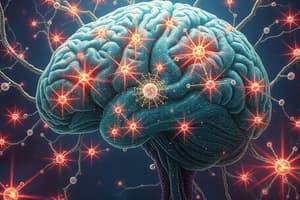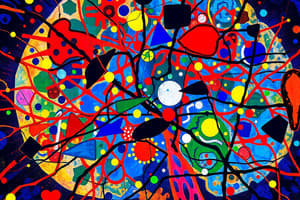Podcast
Questions and Answers
¿Cuál fue el impacto del trabajo de Cajal en la neuropsiquiatría?
¿Cuál fue el impacto del trabajo de Cajal en la neuropsiquiatría?
- Demostró la inexistencia de conexiones entre la psicología y la neuropsiquiatría.
- Contribuyó al desarrollo de la psicología sin influir en la neuropsiquiatría.
- Diseñó los primeros tratamientos para enfermedades neuropsiquiátricas.
- Sentó las bases para el desarrollo de la neuropsiquiatría como campo de estudio. (correct)
¿Qué tipo de estudios realizó Cajal en la Universidad de Madrid?
¿Qué tipo de estudios realizó Cajal en la Universidad de Madrid?
- Estudios sobre arqueología y antropología.
- Estudios sobre enfermedades cardíacas y pulmonares.
- Estudios sobre analgesia hipnótica, amnesia y alucinaciones visuales, auditivas y táctiles. (correct)
- Estudios sobre agricultura y ganadería.
¿Cómo influyeron las ideas de James y Darwin en el trabajo de Cajal?
¿Cómo influyeron las ideas de James y Darwin en el trabajo de Cajal?
- Utilizó los conceptos de creaciónismo en lugar de evolución y selección natural en sus estudios sobre el sistema nervioso.
- Rejectó por completo las ideas de James y Darwin al realizar sus investigaciones sobre el sistema nervioso.
- No se vio influenciado en absoluto por las ideas de James y Darwin en su trabajo sobre neurociencia.
- Incorporó los conceptos de evolución y selección natural en sus estudios sobre la teoría de la neurona y la evolución del sistema nervioso. (correct)
Flashcards are hidden until you start studying
Study Notes
Santiago Ramón y Cajal: His Impact on Neuroscience and Psychology
Santiago Ramón y Cajal was a Spanish neuroscientist who made significant contributions to the field of neuroscience and had a lasting influence on the understanding of brain function and the development of modern psychology. Some of his key contributions include:
The Neuron Doctrine
Cajal's most notable discovery was the role of independent neurons as the main functional unit of the nervous system, which laid the foundation for the neuron doctrine. He proposed that neurons were the primary building blocks of the central nervous system and that they were dynamically polarized, allowing them to deal with ongoing active and brain local structural arrangements as a result of the functional specialization of selected neuronal populations. This concept revolutionized the understanding of brain function and paved the way for further research into the structure and organization of the nervous system.
Brain Plasticity and Memory
Cajal also discussed the concept of brain plasticity as the substrate of memory and learning processes. His work on dynamic polarization and the role of neurons in cognitive functions contributed to the development of modern theories of memory and learning.
Influence on Modern Psychology and Neuropsychiatry
Cajal's interest in mental functions led him to organize a "Committee of Psychological Research" at the University of Madrid, where he conducted several studies on hypnotic analgesia, amnesia, and visual, auditory, and tactile hallucinations. His work and the research of his mentorship, which included renowned Spanish neuropsychiatrists such as Lafora, Achúcarro, Sacristán, Villaverde, Fortún, Prados, and Rodríguez Somoza, laid the groundwork for the development of neuropsychiatry as a field.
The Influence of James and Darwin
Cajal's work was influenced by the ideas of James and Darwin, which shaped his research on the neuron theory and the evolution of the nervous system. He incorporated the concepts of evolution and natural selection into his studies, exploring the role of neurons in the development and functioning of the nervous system.
In conclusion, Santiago Ramón y Cajal's work had a significant impact on the field of neuroscience and psychology, shaping our understanding of brain function and the development of modern psychological theories. His contributions to the neuron doctrine, brain plasticity, and the influence of mental functions on neuropsychiatry have left a lasting legacy in the field of psychology and neuroscience.
Studying That Suits You
Use AI to generate personalized quizzes and flashcards to suit your learning preferences.





